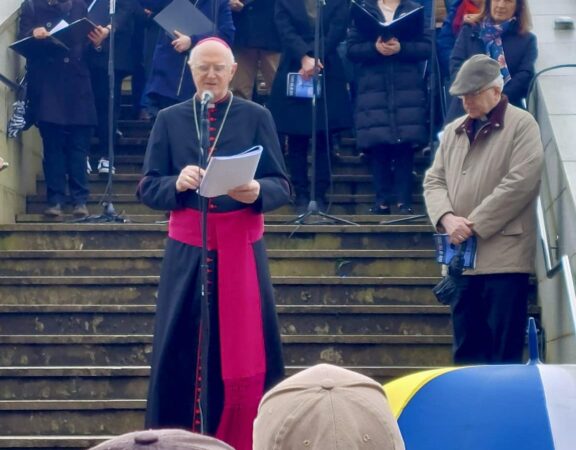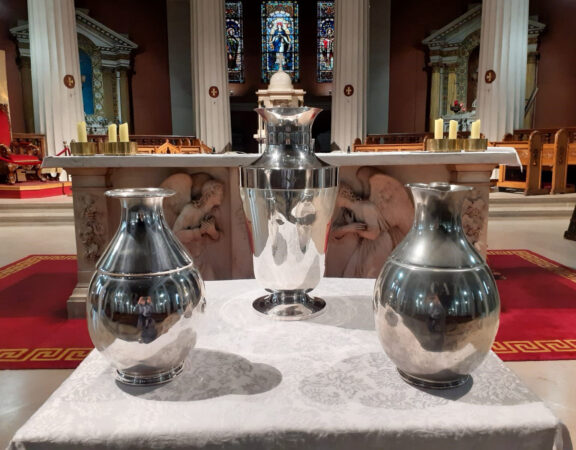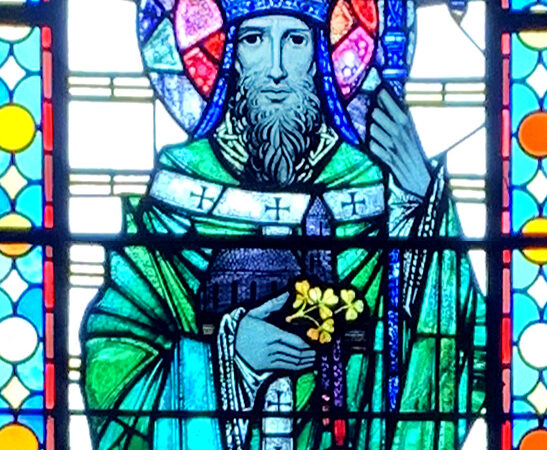Trinity Sunday 2015
MAYNOOTH DIACONATE ORDINATIONS
Homily notes of
Most Rev. Diarmuid Martin
Archbishop of Dublin
———————————————
Saint Patrick’s College Maynooth, 31st May 2015
The Gospel reading of today’s Feast of the Most Blessed Trinity speaks about Jesus’ return to his Father. In those last moments with the Apostles, Jesus reminds them that their mission is to bring the truth the he is a God of love to all nations. And that is our mission today.
The Gospel reminds us that Jesus is still with us today, but in a new way, to lead us to understand his identity and his message in the context of our ever changing culture. The Mystery of the revelation of Jesus’ love is to be prolonged in the world through the faith and the life and the witness of the Christian community.
The Gospel text is full of subtle detail. The event today takes place on a mountain. The major revelations of Jesus took place on a Mountain: his Transfiguration, the Sermon on the Mount, just as God had revealed himself in the Old Testament on Mount Sinai. Matthew wishes to stress that this final encounter between Jesus and his disciples is a moment of significant interpretation of who Jesus is.
We are not told the name of the mountain and in fact the description is quite different to the way the event is told by Saint Luke. In many ways Matthew’s account seems to be constructed in a way which interprets rather than recounts exact historical detail.
The mountain we are told is in Galilee, a place which is on the boundaries of different cultures and peoples. It is also where Jesus had begun his preaching and where he had called his first disciples.
Now he returns to his Father and once again on a mountain in Galilee he reunites his Apostles. But we notice two differences. Matthew goes out of his way to note that there are now just eleven, as Jesus had been betrayed by one of his own. Secondly even among that eleven some still doubted and were perplexed and even disillusioned after the scandal of the cross. Even at this final moment some of the disciples still found it difficult to understand and accept that Jesus had truly risen.
Why would Jesus entrust the mission of bringing his message to all people and all generations to such a weak community, formed of those who were unfaithful and whose faith was still very fragile?
Why did he choose such weak and compromised people to preach a message of conversion? Why does he permit that throughout history and still today within the Church there are those called to responsibility within it who are weak and confused and compromised in their faith and who may even betray their calling. We all know that in our day many drift away from faith and from the Church because of the lack of coherence precisely of those who are called to be leaders and witnesses in a special way.
Some of you will be beginning to ask yourselves why is the Archbishop speaking of weakness and compromise and failure and betrayal to these deacons as they set out on new service in the Church. Would it not be more appropriate to stress the fidelity and strength and commitment which should be the mark of their ministry and encourage them their ministry?
The easy answer for me would be to say that it is the Gospel reading we have heard about the beginnings of the mission of the Church which stresses weakness. Let us try to understand more deeply why this is so.
The Church is never just the Church of the perfect. It is God’s love and his mercy which heals and converts us in our weakness and that is what gives us confidence and encouragement. It is our experience of God’s mercy, rather than our own self-confidence and competence, which enables us to be ministers of God’s mercy.
That is, however, very different from saying that we can acquiesce in the presence of evil in the midst of the Church. That can never be the case. What the Gospel is stressing is that if we place our trust in our own abilities and talents then we may well fail to realise our ambitions and hopes. The power and the mandate received by ministers and disciples of Jesus can only be that authorised by Jesus himself and must always be carried out in the manner revealed by Jesus.
We should remember that at the beginning of his public mission, Jesus was led to another mountain: this time to be tempted by the evil one. Satan offered him all the kingdoms of the world and their glory if Jesus would adore him. We are truly disciples to the extent that we reject all false visions of life and the world. Those called to evangelize must be ministers of Jesus and his love and that alone; otherwise they witness only to themselves, their ambitions, their passions, their harshness and nastiness, their greed, and become ministers of evil rather than of Jesus Christ.
Each of us has to examine what it means for us to be faithful witnesses of Jesus Christ and to recognise where our lives may have drifted away from or even betrayed our calling. Each of us is called to that process of discernment, repentance, conversion and renewal which is the mark of Christian fidelity. We can only be witnesses to Jesus if we allow Jesus to come to our aid in our weakness, through rejecting the arrogance of power and in humility allow ourselves to be healed by Jesus. This is the sense in which Pope Francis always reminds us that he considers himself in the first place to be a sinner.
The former Archbishop of Canterbury, Rowan Williams, delivered a remarkable address to the Synod of Bishops of the Catholic Church some years ago on the theme of renewal in the Church and the need to develop what he called “self-forgetfulness”. By this he meant an attitude which tries to overcome the temptation of creating god’s based on our own ideas, but rather walking a path of encountering God through contemplation. Without that sense of “self-forgetfulness” Archbishop Williams says, the Church runs the risk “of trying to sustain faith on the basis of an untransformed set of human habits – with the all too familiar result that the Church comes to look unhappily like so many purely human institutions: anxious, busy, competitive and controlling”.
There is another curious detail which Matthew notes: when Jesus appeared, the eleven fell down before him. This was not the way in which they would have encountered him during his earthly mission. Even at the Transfiguration the three apostles who were with Jesus on the Mountain observed from a distance, not prostrated in front of him. What is this saying? It is saying that we only truly encounter Jesus when we recognise his otherness. Renewal of the Jesus needs moments when we fall down in contemplation and prayer.
Dear candidates: you are called in a special way to a ministry of service. Service can never be a part-time job where you can clock-in and clock-out your hours. You are called not take on a new job but to accept a new identity. An identity of service involves renouncing any vision of yourselves as being the sole protagonists of your mission. You are called to identify with Jesus who comes to serve and who accepted that mission of service totally and to the end. When you receive the book of the Gospels today, the sacred rite reminds you of the nature of your ministry as a Deacon: “Believe what you read, teach what you believe and practice what you teach”. This is in the first place a mandate to live a life of integrity and coherence with the Gospel.
Jesus revealed his service in giving himself unto death. That service even unto death was then transformed when the Father raised Jesus from the dead. We Christians are witnesses to the fact that Jesus is risen. Our lives and our language must always therefore be language of resurrection. Language of resurrection is language of hope and newness, never a language of gloom or negativity or simple repetition of formulae. Language of resurrection changes our weakness into a new strength.
Pope Francis writes: “Christ’s resurrection is not an event of the past; it contains a vital power which has permeated the world. When all seems to be dead, signs of the resurrection spring up… On razed land, life breaks through stubbornly yet invincibly”.
Archbishop McQuaid once told me the story of how he had a path in his garden sturdily re-constructed and professionally re-tarred and was proud of how fresh and practicable it was. Then one day, as he was doing his regular walk what did he see: a beautiful, delicate, fresh, tiny and shiny green blade of grass breaking through his sturdily built path. Resurrection breaks through stubbornly yet invincibly. It is not we who create new life. New life breaks through what we construct.
We Irish, myself included, have a great ability to identify where things are going wrong. I had a friend whose letters to me could be summed up: “I am so happy to be able to tell you that things are even worse than we imagined”.
They are not words of resurrection, but we often fall precisely into that temptation of feeling that change is impossible? We can easily fall into a cynicism which not just paralyses but destroys. We feel that situations are so complex that it is hardly worth making the effort. So often we end up responsible for situations where, to quote Pope Francis again:
“the Gospel, the most beautiful message that this world can be offered, ends up buried in a pile of our excuses”.
The Spirit spoke to the Church at Pentecost. The Spirit also gave his disciples words and language that could be understood and appropriated by everyone who took the time to listen. We need to rediscover words and language of Resurrection.
Dear candidates: Our hope comes from the final words of Jesus which we hear in today’s Gospel: “I will be with you”. The Gospel of Matthew ends as it began with the announcement of Emmanuel, God with us. “God with us”: to invite us to share in his life and to reflect his life in the world. That life is the life of the Blessed Trinity, not the life of a harsh, isolated and judgemental God, but the God of Jesus Christ, the one through whom we encounter the “tender loving-kindness of our God”.
The harshness of our world needs that message. Our prayer is that you in your ministry as deacons will allow that loving kindness to transform you and bring that message of mercy to others and that you yourselves will be able to experience in your own life and your ministry the freedom and the joy that God’s mercy brings to the ministers of his Gospel.









